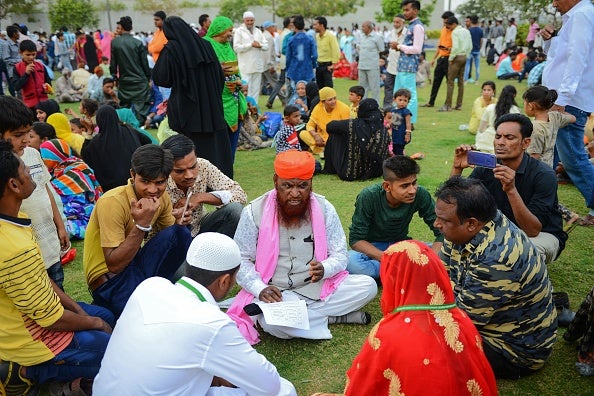‘We don’t see this couple as Hindu-Muslim’: Indian court throws out case against interfaith marriage
High Court criticises a previous court order which had said that conversion for sake of marriage was illegal

Your support helps us to tell the story
From reproductive rights to climate change to Big Tech, The Independent is on the ground when the story is developing. Whether it's investigating the financials of Elon Musk's pro-Trump PAC or producing our latest documentary, 'The A Word', which shines a light on the American women fighting for reproductive rights, we know how important it is to parse out the facts from the messaging.
At such a critical moment in US history, we need reporters on the ground. Your donation allows us to keep sending journalists to speak to both sides of the story.
The Independent is trusted by Americans across the entire political spectrum. And unlike many other quality news outlets, we choose not to lock Americans out of our reporting and analysis with paywalls. We believe quality journalism should be available to everyone, paid for by those who can afford it.
Your support makes all the difference.In a blow to Hindu hardliners in the fiery debate over interfaith marriage in India, a state’s high court has struck down a previous order that religious conversion “just for the purpose of marriage” was unacceptable.
The Allahabad High Court gave the ruling as part of its decision in a case filed against a Muslim man by the parents of his formerly Hindu wife, who had converted to Islam last year before marrying him.
It’s the sort of case that would have been held up as an example of the right-wing conspiracy theory “Love Jihad”, which claims a coordinated campaign by Muslim men to convert Hindu women to Islam through seduction or forced marriage.
Passing their judgement, the two-judge bench said: “We do not see Priyanka Kharwar and Salamat Ansari as Hindu and Muslim, rather as two grown-up individuals who - out of their own free will and choice - are living together peacefully and happily over a year.”
The judges said that “the right to live with a person of his/her choice irrespective of religion… is intrinsic to the right to life and personal liberty”, adding that “interference in a personal relationship would constitute a serious encroachment into the right to freedom of choice of the two individuals”.
Earlier in September, a single judge bench of the same court had dismissed a petition filed by an interfaith couple seeking direction to others to not interfere in their married life.
The court in its order observed that conversion “just for the purpose of marriage”, and where the religious belief of the party involved is not a factor, is unacceptable.
The new ruling, passed on 11 November, said that the prior order was not “good law”.
But at the same time, it stopped short of commenting on “the validity of alleged marriage/conversion” in general. It said its ruling was limited to cancelling a specific case where no offences were made as “two grown-up individuals are before us, living together for over a year of their own free will and choice”.
The order comes at a critical juncture, with the previous ruling by the Allahabad High Court being cited by chief ministers of the ruling Hindu nationalist BJP in several states which have threatened to pass laws against interfaith marriage.
Five BJP-ruled states have vowed to bring new legislation against so-called “Love Jihad”, a theory that continues to find an appeal in India’s communally charged society despite the fact that official investigations launched in 2009, 2010, 2012 and again in 2014 found no evidence of such coordinated activity.
More recently, a “special investigation” launched by the police in the Indian state of Uttar Pradesh over allegations of a “rise in Love Jihad” ruled out any conspiracy angle in the 14 cases that it investigated. The probe also found no evidence that any of the Muslim youths involved had received funding from abroad, one of the key tenets of the “Love Jihad” claims.




Join our commenting forum
Join thought-provoking conversations, follow other Independent readers and see their replies
Comments